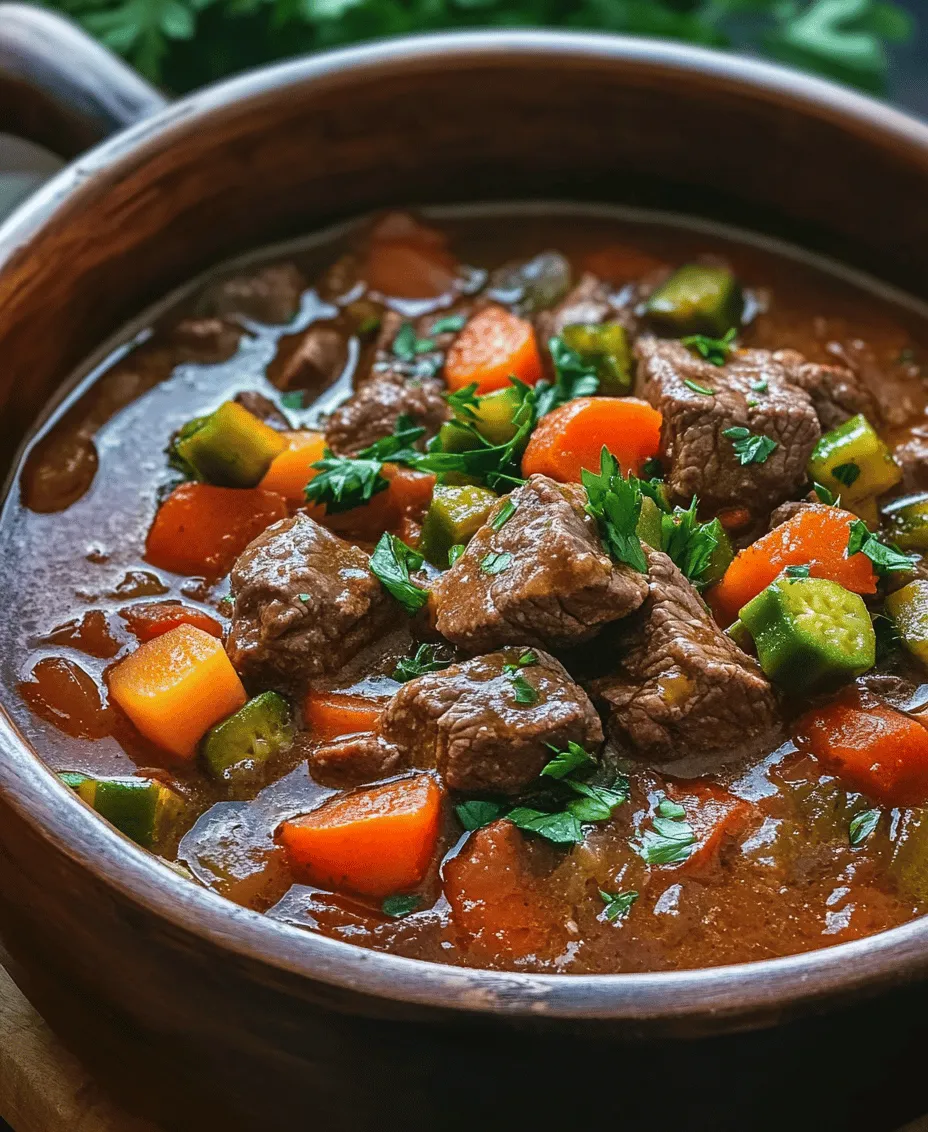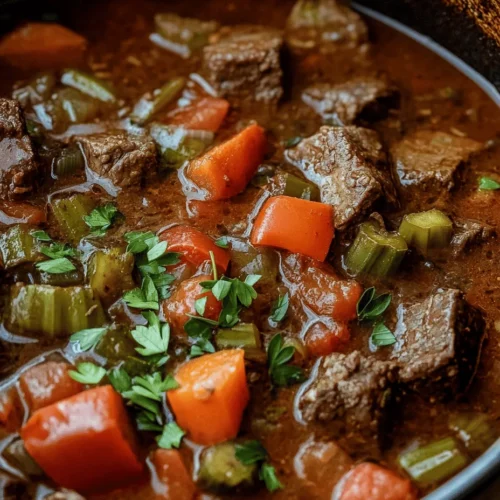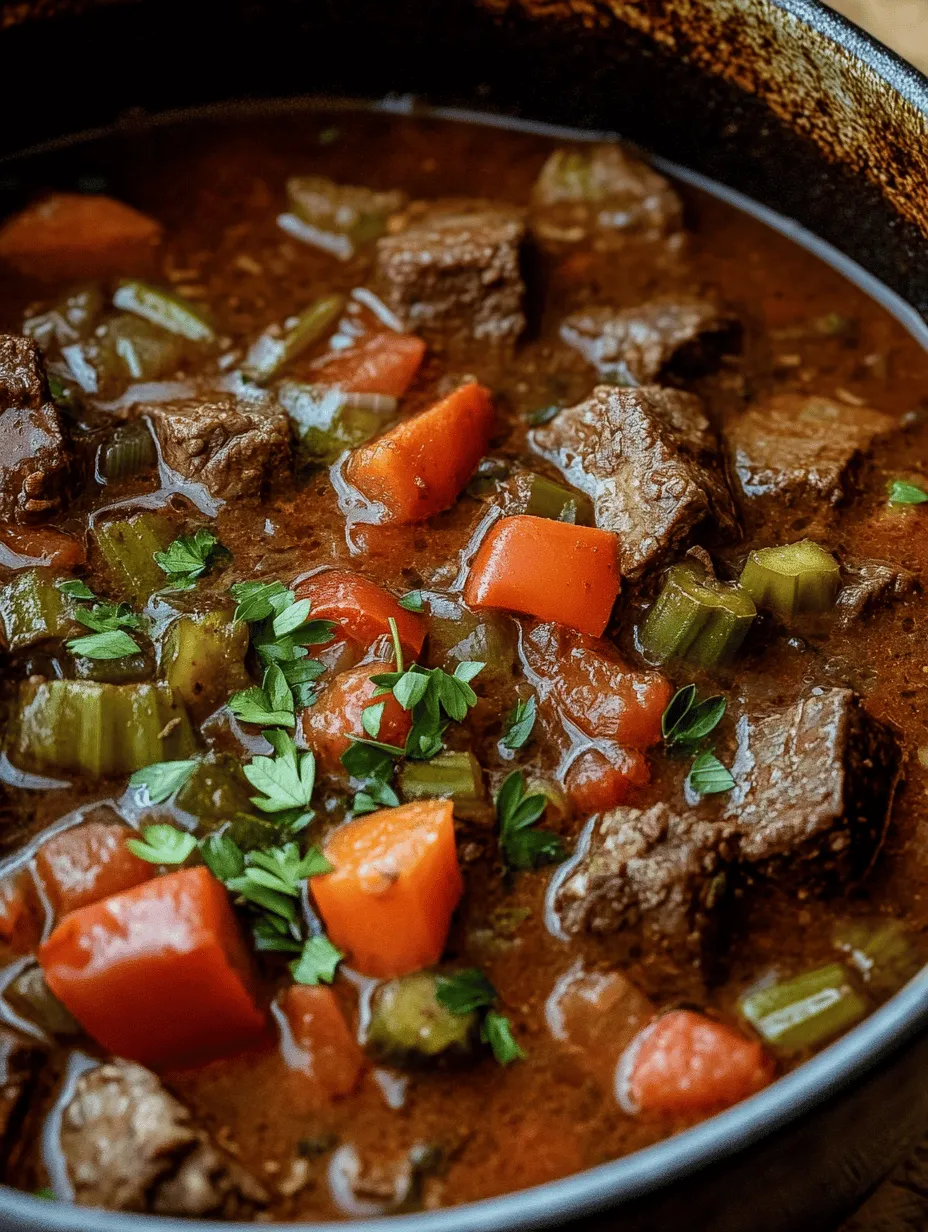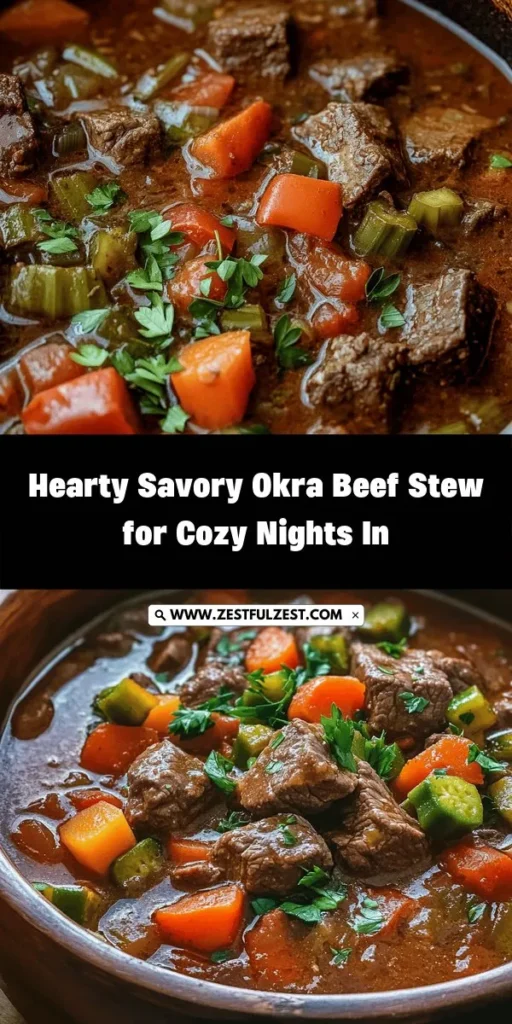Introduction
Savory Okra Beef Stew stands as a testament to hearty, wholesome cooking that warms both the body and soul. This dish marries tender beef with vibrant vegetables, creating a symphony of flavors that is as comforting as it is satisfying. The use of okra not only adds a unique texture but also introduces a depth of flavor that elevates this stew from a simple meal to a culinary experience. Rich in nutrients and steeped in cultural significance, this stew is perfect for family dinners or gatherings with friends, providing a delightful way to share comfort food at its best.
As we embark on this culinary journey, this article will guide you through the process of creating Savory Okra Beef Stew. We will delve into the essential ingredients, cooking techniques, and the cultural backdrop of the dish, ensuring you have all the knowledge needed to recreate this masterpiece in your kitchen.
Understanding the Ingredients
The foundation of any great stew lies in its ingredients. For Savory Okra Beef Stew, we focus on a select few key components that bring flavor, nutrition, and satisfaction to the table. Let’s explore these ingredients in detail.
The Protein: Beef Chuck
When it comes to stews, the choice of protein can significantly affect the final dish. Beef chuck is the ideal cut for this recipe due to its rich marbling and robust flavor. This cut comes from the shoulder of the cow, making it particularly suitable for slow-cooking methods. The connective tissues in beef chuck break down during the cooking process, resulting in tender, juicy bites that melt in your mouth.
Choosing the right cut of beef is crucial for achieving a flavorful stew. Beef chuck is known for its ability to absorb the surrounding flavors while maintaining its own distinctive taste. When properly cooked, it becomes incredibly tender, adding to the overall heartiness of the stew. Look for cuts that have a good amount of fat and marbling, as these qualities will enhance the flavor and texture of your dish.
The Star Vegetable: Okra
Okra is the standout vegetable in this stew, known for its unique texture and exceptional thickening properties. Often used in Southern and Creole cooking, okra has a slightly grassy flavor that complements the richness of the beef. When cooked, the pods release a mucilage that naturally thickens the stew, giving it a luxurious mouthfeel without the need for flour or cornstarch.
Nutritionally, okra is a powerhouse. It is low in calories yet rich in dietary fiber, which aids in digestion and helps maintain a healthy gut. Additionally, okra is packed with vitamins A and C, as well as antioxidants that contribute to overall health. Its inclusion in the stew not only enhances the dish’s flavor but also boosts its nutritional profile, making it a wholesome meal option.
Aromatic Enhancements
Aroma is a critical element in cooking, and in Savory Okra Beef Stew, ingredients like onions, garlic, bell peppers, and tomatoes play a key role in building a robust flavor profile.
Onions and garlic serve as the aromatic base of the stew. When sautéed, they release their natural sugars and develop a sweetness that balances the savory notes of the beef. The addition of bell peppers adds a slight crunch and a hint of sweetness, while tomatoes contribute acidity and moisture, creating a well-rounded stew. Carrots, sliced thinly, add a touch of earthiness and sweetness, enhancing the stew’s overall flavor and texture.
Together, these ingredients create a fragrant base that sets the stage for the stew, ensuring that each bite is filled with complex flavors.
Seasoning the Stew
The significance of seasoning cannot be overstated in any dish, and Savory Okra Beef Stew is no exception. The right combination of spices can elevate the dish from ordinary to extraordinary.
In this recipe, spices such as paprika, thyme, and cayenne pepper are essential for enhancing the flavors. Paprika adds a subtle smokiness, while thyme introduces an aromatic earthiness that pairs beautifully with the beef. A dash of cayenne pepper provides a gentle heat that lingers, balancing the sweetness of the vegetables.
Salt and pepper are fundamental in this dish, acting as flavor enhancers that bring out the natural tastes of the ingredients. Proper seasoning is key to achieving a well-balanced stew, so be sure to taste as you go and adjust accordingly.
Cooking Techniques Explained
To create the perfect Savory Okra Beef Stew, understanding the cooking methods involved is crucial. This stew benefits from a combination of techniques that ensure the beef is tender, the vegetables are flavorful, and the stew has a rich consistency.
Searing the Beef
The first step in the cooking process is searing the beef chuck. This technique is vital for developing a deep, rich flavor in the stew. To properly sear the beef, begin by cutting it into uniform cubes, ensuring even cooking. Heat a heavy-bottomed pot or Dutch oven over medium-high heat, adding a splash of oil to coat the bottom.
Once the oil is shimmering, add the beef in batches to avoid overcrowding the pot. Searing the meat creates a caramelized crust that locks in moisture and flavor. Allow the beef to brown on all sides before removing it from the pot and setting it aside. This step not only enhances the flavor but also contributes to the stew’s overall richness.
In the next segment, we will explore the remaining steps in creating this delightful stew, including how to combine the ingredients and the final cooking process that brings everything together into a comforting bowl of goodness. Stay tuned to learn how to create a dish that will become a staple in your kitchen, warming hearts and filling bellies for years to come.

Sautéing Aromatics
To build a flavorful foundation for your Savory Okra Beef Stew, begin with the essential step of sautéing aromatics. Start by heating a generous amount of oil in a large, heavy-bottomed pot over medium heat. Olive oil or vegetable oil works well, but for an added depth of flavor, consider using a mix of butter and oil.
Once the oil shimmers, add finely chopped onions. Sauté the onions for about 5-7 minutes until they become translucent and slightly caramelized. This process not only enhances their natural sweetness but also adds a rich, fragrant base to your stew.
Next, introduce minced garlic, stirring it into the onions. Cook for an additional 1-2 minutes. Be cautious not to burn the garlic; its flavor can turn bitter if overcooked. By sautéing these aromatics together, you create a harmonious blend that will serve as the heart of your stew, setting the stage for the other ingredients to shine.
Building the Stew
With the aromatics ready, it’s time to build your stew. Start by adding your beef, which should be cut into bite-sized cubes. Brown the beef on all sides, which typically takes about 5-8 minutes. This step is crucial as it adds a layer of flavor through the Maillard reaction, which occurs when proteins and sugars react under heat.
Once the beef is browned, it’s time to add the other vegetables. Carrots and bell peppers not only contribute to the stew’s flavor but also add vibrancy and nutrition. Chop them into uniform pieces to ensure even cooking. Stir in these vegetables, allowing them to soften for around 5 minutes.
Next, pour in your broth—beef or vegetable, depending on your preference—and add crushed tomatoes along with any herbs you’re using, such as thyme or bay leaves. Bring the mixture to a gentle simmer. This simmering process is vital for tenderizing the beef; as it cooks, the connective tissues break down, yielding a wonderfully tender and flavorful stew. Allow the stew to simmer for at least 1.5 to 2 hours, stirring occasionally, until the beef is fork-tender and the flavors meld beautifully.
Incorporating Okra
As your stew nears completion, it’s time to introduce the star ingredient: okra. Okra should be added during the last 15 to 20 minutes of cooking to prevent it from becoming overly mushy. If you use fresh okra, wash and trim the ends, then slice them into rounds. If using frozen okra, you can add it directly without thawing, as it will cook quickly in the simmering stew.
The texture of okra can vary based on whether it’s fresh or frozen. Fresh okra tends to have a firmer bite, while frozen okra may break down a bit more, adding a slight thickness to the stew. Both options will contribute to the dish’s unique flavor and character, so choose according to your preference.
Tasting and Adjusting Flavors
One of the most critical steps in cooking any dish is tasting and adjusting flavors. As the stew simmers, periodically sample it to check for seasoning and balance. Depending on your palate and the saltiness of your broth, you may need to add a pinch of salt or a splash of vinegar to brighten the flavors.
Consider the addition of spices such as cayenne pepper or paprika for those who enjoy a little heat. Remember that personal preferences vary; some may prefer a sweeter stew with more tomatoes, while others may enjoy a more savory profile. Don’t be afraid to experiment during the cooking process; this is your creation!
Serving Suggestions
Now that your Savory Okra Beef Stew is complete, it’s time to think about serving. Ladle the stew into bowls while it’s still steaming hot. For a rustic touch, serve it with a slice of crusty bread; this will allow everyone to soak up the delicious broth. A simple side of steamed rice is another fantastic accompaniment, providing a neutral base that pairs beautifully with the rich stew.
Accompaniments
To elevate your dining experience, consider garnishing each bowl with freshly chopped parsley or cilantro. This not only adds a pop of color but also a hint of freshness that contrasts nicely with the hearty flavors of the stew. For an added layer of richness, a dollop of sour cream or a sprinkle of grated cheese can provide creaminess and balance the dish’s robust flavors.
Cultural Significance
Savory Okra Beef Stew is more than just a delightful dish; it is steeped in cultural significance. Okra has roots in various cuisines, particularly within African, Middle Eastern, and Southern American traditions. It’s a versatile vegetable that has been embraced by many cultures. In the Southern United States, for instance, okra is a staple in gumbo, showcasing its adaptability in hearty stews.
Beef stews, on the other hand, are found in countless culinary traditions worldwide, each with its unique twist. From Irish beef and Guinness stew to French beef bourguignon, the concept of slow-cooked meat and vegetables resonates across cultures as a form of comfort food. This dish reflects the universal appeal of hearty meals that bring families together, making it a cherished recipe in many households.
By preparing Savory Okra Beef Stew, you’re not just cooking a meal; you’re participating in a rich culinary tradition that spans continents and generations. Each bite carries with it a sense of history and connection to those who have enjoyed similar dishes around the globe.
Conclusion
Savory Okra Beef Stew is not just a recipe; it’s an invitation to explore flavors, textures, and cultural significance. By understanding the ingredients, mastering the cooking techniques, and recognizing the importance of each step, you can create a dish that warms the heart and nourishes the soul.
This stew is an opportunity to gather loved ones around the table, sharing stories and making memories that extend beyond the meal itself. So, embrace the journey of cooking this delightful stew—let the aromas fill your kitchen, and enjoy the rich, comforting flavors that this dish brings to your table. Whether you’re cooking for a family dinner or a cozy night in, Savory Okra Beef Stew is sure to be a crowd-pleaser, reflecting the essence of comfort food in every bite.



